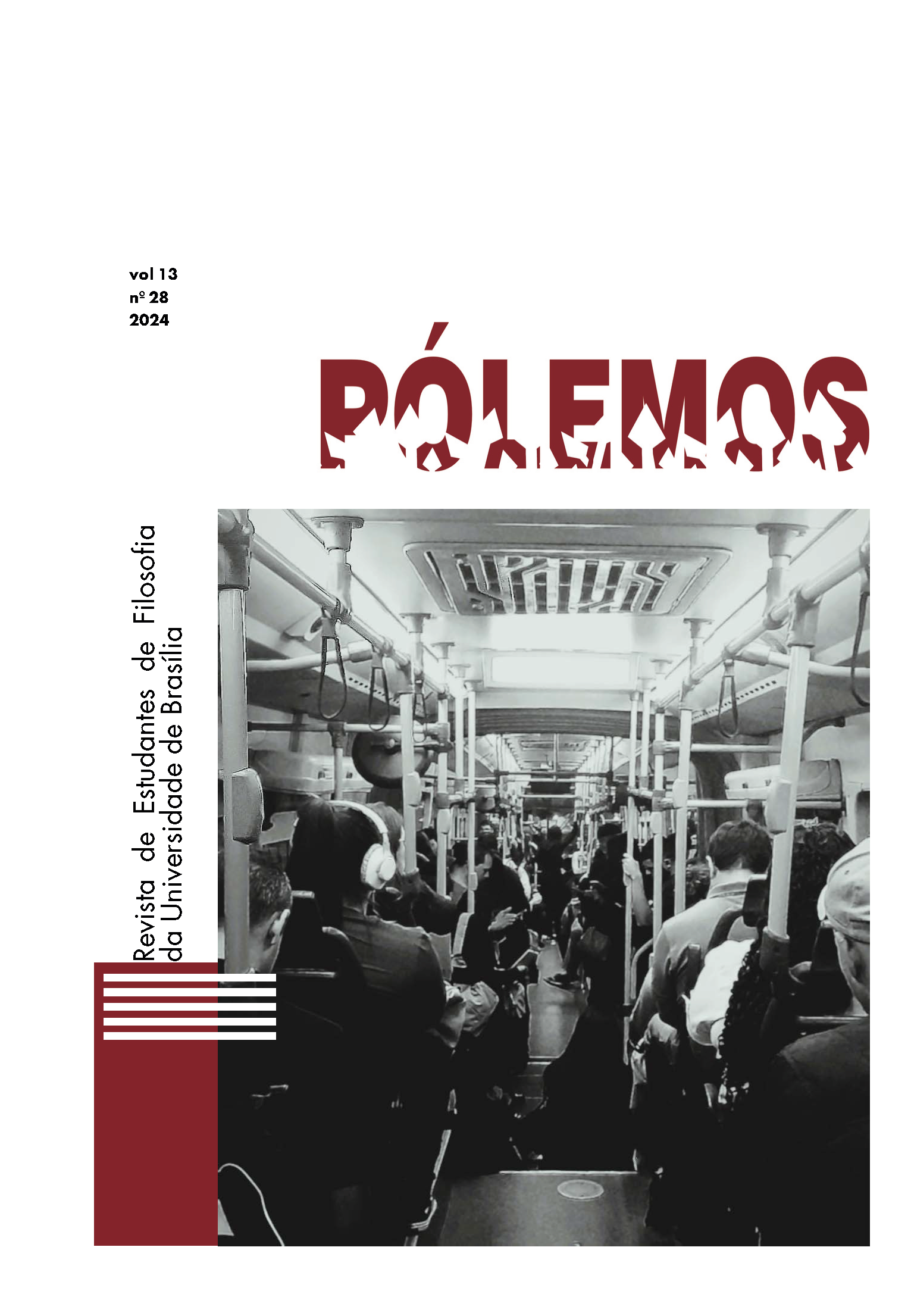SELF-PREDICATION AND THE IDEA OF THE GOOD IN PLATO’S REPUBLIC
DOI:
https://doi.org/10.26512/pl.v13i28.54189Keywords:
Idea. Good. Self-predication. Republic. Plato.Abstract
In the 20th century, many complex interpretations of the role of the Idea of the Good in Platonic metaphysics were constructed on the basis of an analysis of the Simile of the Sun in Plato’s Republic. Among the most prominent interpretations is that developed by Gerasimos Santas (1980), whose originality lies in the fact that it is founded on a conceptual framework developed by analytic scholars based on a passage from Aristotle’s Topics (Owen, 1968; Keyt, 1969 & 1971; Vlastos, 1965 & 1972; etc.). Based on this passage, these scholars identify a distinction of attributes of Platonic Ideas, which Santas uses to define the role of the Idea of the Good as the ‘Idea of Ideas’, i.e. the Idea that is the cause of the other Ideas being Ideas. This article evaluates the assumptions underlying Santas' interpretation of the Idea of the Good, and, in the light of Vlastos' studies, argues for its incompatibility with the text of the dialogues.
Downloads
References
ALLEN, R. E. Participation and Predication in Plato's Middle Dialogues. In: ALLEN, R. E. (ed.). Studies in Plato's Metaphysics. London: Routledge and Kegan Paul, 1967, pp. 43-60. (1a. ed. 1960)
ARISTOTE. Topiques. Tome I. Livres 1-4. Trad. J. Brunschwig. Paris: Les Belles Lettres, 1967.
ARISTOTE. Topiques. Tome II. Livres 5-8. Trad. J. Brunschwig. Paris: Les Belles Lettres, 2007.
ARISTÓTELES. Tópicos. Tradução de L. Vallandro e G. Bornheim. São Paulo: Abril Cultural, 1973 (Coleção Os Pensadores).
ARISTOTLE. Topics. Books I and VIII. Transl. by R. Smith. Oxford: Clarendon Press, 2003 (1997).
ARISTOTLE. Posterior Analytics. Topica. Transl. by H. Tredennick and E. S. Forster. Cambridge: Harvard University Press, 1955.
BRAGA DA SILVA, A. L. Platão, o Bem, e a fragilidade da jangada humana. Um estudo sobre o Símile do Sol na República. São Paulo: FFLCH / USP, 2017 (Tese). Disponível em: https://www.teses.usp.br/teses/disponiveis/8/8133/tde-18072017-160906/publico/2017_AndreLuizBragaDaSilva_VCorr.pdf. Acesso em: 05 jun. 2024.
BRAGA DA SILVA, A. L. The “Ideas as thoughts” hypothesis of Parmenides 132b-c: an historical approach. In: BRISSON, L.; RENAULT, O.; MACÉ, A. (Org.). Plato's Parmenides. Selected Papers of XII Symposium Platonicum. Baden-Baden: Academia / Nomos Verlag / International Plato Society, 2022, pp. 59-66.
BRAGA DA SILVA, A. L. Does Plato revise his ontology in Sophist 256a? Notes on the 'being' of the Ideas. In: BRISSON, L.; HALPER, E.; PARRY, R. (Org.). Plato's Sophist. Selected Papers of the XIII Symposium Platonicum. Baden-Baden: Academia / Nomos Verlag / International Plato Society (no prelo).
CHERNISS, H. Aristotle's criticism of Plato and the Academy. Baltimore: Johns Hopkins Press, 1946. (1a. ed. 1944)
FINE, G. (ed.) Plato. 1, Metaphysics and Epistemology. Oxford: Oxford University Press, 1999.
KEYT, D. "Plato's paradox that the Immutable is Unknowable". Philosophical Quartely 19 (1969), p. 1-14.
KEYT, D. The mad craftsman of the Timaeus. Philosophical Review, v. 80, n. 2, p. 230-235, 1971. Disponível em: https://www.jstor.org/stable/2184032. Acesso em: 05 jun. 2024.
OWEN, G. E. L. Dialectic and Eristic in the treatment of Forms. In: OWEN, G. E. L (ed.). Aristotle on Dialectic: the Topics. Proceedings of the Third Symposium Aristotelicum. Oxford: Clarendon Press, 1968, pp. 103-125. [Reeditado em: OWEN, G. E. L.; NUSSBAUM, M. C. (ed.). Logic, science, and dialectic: collected papers in Greek philosophy. Ithaca, New York: Cornell University Press, 1986.]
ROSS, W. D. Plato's Theory of Ideas. Oxford: Clarendon Press, 1953. (1a. ed. 1951)
SANTAS, G. The Form of the Good in Plato's Republic. Philosophical Inquiry (1980). [Reeditado em: ANTON, J. P.; PREUS, A. (ed.) Essays in Ancient Greek Philosophy vol. II. Albany: State University of New York Press, 1983; e em FINE, G. (ed.) Plato. 1, Metaphysics and Epistemology. Oxford: Oxford University Press, 1999, pp. 247-274.
SHIELDS, C. Surpassing in Dignity and Power: The Metaphysics of Goodness in Plato's Republic. In ANAGNOSTOPOULOS, G. (ed.). Socratic, Platonic and Aristotelian Studies: Essays in Honor of Gerasimos Santas. London: Springer Science+Business Media, 2011, pp. 281-296. DOI: http://dx.doi.org/10.1007/978-94-007-1730-5_17.
VLASTOS, G. A metaphical paradox. In: VLASTOS, G. Platonic Studies. Princeton: PUP, 1973, pp. 43-57. (1a. ed. 1965/1966) ["1973a"].
VLASTOS, G. Degrees of reality. In: VLASTOS, G. Platonic Studies. Princeton: PUP, 1973, pp. 58-75. (1a. ed. 1965) ["1973b"].
VLASTOS, G. Reason and Causes in the Phaedo. In: VLASTOS, G. Platonic Studies. Princeton: PUP, 1973, pp. 76-110. (1a. ed. 1969) ["1973c"].
VLASTOS, G. Self-predication in Plato’s Later Period. In: VLASTOS, G. Platonic Studies. Princeton: PUP, 1973, pp. 335-341. (1a. ed. 1969) ["1973d"].
VLASTOS, G. The Unity of Virtues in the Protagoras. In: VLASTOS, G. Platonic Studies. Princeton: PUP, 1973, pp. 221-265. (1a. ed. 1972) ["1973e"].
VLASTOS, G. An Ambiguity in the Sophist. In: VLASTOS, G. Platonic Studies. Princeton: PUP, 1973, pp. 270-308. ["1973f"].
VLASTOS, G. The “Two-Level Paradoxes” in Aristotle. In: VLASTOS, G. Platonic Studies. Princeton: PUP, 1973, pp. 323-334. ["1973g"].
Downloads
Published
How to Cite
Issue
Section
License
Copyright (c) 2024 PÓLEMOS – Revista de Estudantes de Filosofia da Universidade de Brasília

This work is licensed under a Creative Commons Attribution-NonCommercial-NoDerivatives 4.0 International License.
Todos os trabalhos que forem aceitos para publicação, após o devido processo avaliativo, serão publicados sob uma licença Creative Commons, na modalidade Attribution-NonCommercial-NoDerivatives 4.0 International Public License (CC BY-NC-ND 4.0). Esta licença permite que qualquer pessoa copie e distribua a obra total e derivadas criadas a partir dela, desde que seja dado crédito (atribuição) ao autor / Ã autora / aos autores / às autoras.


